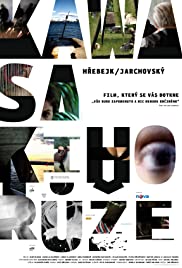
KAWASAKI’S ROSE
Czech Republic, 2009, 100 minutes, Colour.
Directed by Jan Hrebejk.
The title comes from an origami design introduced at the end of the film, indicating the various layers in the design. There is also character, a Japanese artist who suffered grief has been taken in by a cheque sculptor living in Gothenburg, Sweden. However, the film is mainly about a family coming to terms with an award being made to a famous psychiatrist, the Memory of the Nation award.
A documentary is being made about him and his wife. His son-in-law is one of the filmmakers, as is the girlfriend, with whom he has taken on an affair while his wife is in hospital, suffering from cancer. She is released from hospital. The husband wants to make a break and be with his girlfriend. The couple also have a teenage daughter, with dyed red hair, who has her own teenage problems.
When the filmmaker gets some secret information and files, the filmmaking crew go to interview a man who was in the police, an interrogator and a torturer. He reveals truths about the professor – as well as the relationship between the professor and his wife before his daughter was born. This involves the radical sculptor, who spoke out against the Communist regime, who was exiled after torture. It emerges that the professor had supplied information and questions for the interrogation.
The action moves from Prague to Gothenburg, a much sunnier place, cheerful with the robust sculptor. It emerges then that he is the father of the woman with cancer and she and her daughter visit him. Eventually the action is back to Prague where there is confession and reconciliation.
The film won many awards including the Ecumenical Award for the Panorama section in the Berlin film Festival, 2011.
1. An award-winning drama? Questions about Czech history?
2. The history of Czech people in the 20th century, the Communist era, the Velvet Revolution? The Russian suppression? Collaborating with the Communist authorities? The reassessment? The attitude of the new generation who had not experienced this directly? The transformation of the Czech Republic after the fall of communism?
3. The contract with Sweden, the beauty of the city, the water, light and colour?
4. The title, Kawasaki being introduced at the end of the film, his personal suffering, his stopping his art, eventually starting again, the origami, the design of the rose – the gift? And his accompanying the group for the reconciliation in Prague?
5. The narrative about the medal of honour for the nation? The flashbacks? The television program, the making, the setting up scenes? Going beyond the documentary?
6. Pavel Josek and his status, his being a famous psychiatrist, the announcing of the award, the decision to make the television program, the scenes at home, the artificial acting of the scenes, the dialogue? Pavel’s wife? The beginnings of the back story and the revelation?
7. Ludek, Lucy and her time in hospital, the good prognosis from the cancer? Their daughter at home? Her return home, Ludek receiving her at home? Yet his relationship with the television assistant? His promises to her? Her expectations? Interactions at home, his wanting to move out, Lucy and her reactions, ousting him? Her dependence on her parents? Her mother’s observation on Ludek?
8. The documentary making, the girlfriend, the investigation, Ludek getting the documents, examining them, giving them to his wife?
9. The flashbacks, dramatising the truth, Pavel’s wife and her relationship with Borek? His work as a sculptor? Dissident? The arrests, the interrogations, the woman pregnant? Suspicions, the role of the psychiatrist, preparing the questions for the interrogation? Borek, his not knowing the woman was pregnant, going to exile? The woman and her engagement with the psychiatrist, marriage, the birth of her daughter? The psychiatrist tanding by his wife over the decades? The explanations to the television crew?
10. Borek, character, sculptor, heart, his spheres? The group looking at his sculptures? His life in Sweden, for many decades, family? Extrovert type? With the television crew? His discovering the truth, not knowing that the woman’s child was his? His meeting with his daughter, granddaughter? Showing them around? Exuberance, return to Prague?
11. Lucy, with her daughter, issues of discipline at home? The decision to go to Sweden, meeting Borek, discussions, learning the truth, the effect?
12. The television team tracking down the interrogator from the past, the interview with him, his really revealing the truth about the professor, about his wife, about Borek? His sinister character?
13. The group returning to Prague from Sweden, meeting with the professor and his wife, the resolution? The ceremony and the professor receiving his medal?
14. The times, the powerful hold on people, psychological pressure (and suggesting the refusal of medication for family friends)? Intellectual torture? The overcoming of this past – an acknowledgement, and learning to live with it, and confession and repentance?